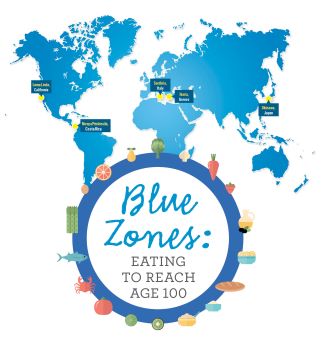September 2023
Blue Zones: Eating to Reach Age 100
Blue zones refers to places around the globe where people are much more likely to live to age 100, compared with the average American. They tend to stay healthier as they get older, too. Many make it to ripe old ages without developing heart problems, diabetes, obesity, or cancer.

Among the world’s best-studied blue zones are:
-
Okinawa, Japan
-
Ikaria, Greece
-
A region of Sardinia, Italy
-
Nicoya Peninsula, Costa Rica
-
Loma Linda, California
For two decades, researchers have looked for common threads tying these places together. One important thing they share is healthy eating habits.
Diets with a plant slant
Typical diets in the blue zones are heavy on plant-based foods. Examples are fruits, vegetables, whole grains, nuts, and beans. When meat is a part of meals, it’s eaten in moderate amounts. This eating style has been linked to a decreased risk for many common long-term diseases.
Mealtime customs in the blue zones help prevent overeating. For example, Okinawans may repeat a saying before meals that reminds them to stop eating when they feel 80% full.
Lifestyles for longevity
A healthy diet pairs well with physical activity. Many people who live in the blue zones are active even as they near triple-digit ages. Movement is woven into their daily routines.
As the world’s longest-living populations show, eating wisely and being active matter. Whether you’re 35 or 95, you can still learn from your elders.